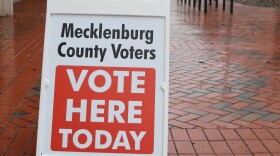The last time Republican lawmakers rewrote state law giving themselves more power over the makeup of North Carolina's Board of Elections, a court ultimately struck it down.
The North Carolina Supreme Court issued a majority decision in 2018 — when Democratic justices outnumbered Republicans — upholding a lower court ruling that overturned the GOP-backed law in favor of the governor's executive authority over the elections board.
But things have changed since then, including the high court's partisan makeup. Republican justices are now in the majority following the 2022 midterm elections.
On Monday, leaders of the North Carolina General Assembly's GOP majority unveiled a bill that would reconstitute the state elections board from a five-member body consisting of gubernatorial appointees to an even-numbered, eight-member body.
And instead of the governor getting to appoint three members from his or her own party, under the bill, the board's eight members would be appointed by lawmakers, two each appointed by Senate and House majority leaders and two each from the chambers' minority leaders.
More importantly, deadlocked votes on issues like appointing the board's chairman or executive director would go to the legislature.
"No one party should have exclusive control of our elections," said state Sen. Paul Newton, R-Cabarrus, a co-chairman of the Redistricting and Elections Committee and a co-sponsor of the bill.
The proposal also would reconstitute local elections boards, making them four-member bodies consisting of one member each appointed by majority and minority leaders in the state House and Senate.
What's more, the GOP-backed measure would give authority over emergency powers to the board as opposed to the agency's executive director. Emergency powers, for example, could include altering election schedules in response to a natural disaster.
Senate President Pro Tem Phil Berger, R-Rockingham, made it clear that the proposed changes to the law are a GOP response to decisions made by the Democratic Gov. Roy Cooper-appointed elections board in the run-up to the 2020 elections.
As part of its response to the COVID-19 pandemic, the state elections board altered some rules around absentee-by-mail voting. GOP lawmakers were furious over what they saw as a partisan circumvention of the legislative process.
They sued and a federal court upheld a rules change that extended North Carolina's three-day grace period to nine days for counting mail-in ballots postmarked by Election Day. But a change that would have allowed voters to submit an affidavit to fix problems on their absentee ballots with the witness information was struck down.
"Their actions back in 2020 showed a willfulness to blatantly ignore state law in favor of pursuing ways to achieve a partisan policy goal," Berger told reporters at a news conference to explain the new Republican-backed bill, referring to the elections board's emergency actions amid the pandemic.
But Democrats like Sen. Dan Blue, D-Wake, say it's Republicans who are using elections law to achieve partisan goals.
“This is a power grab, plain and simple," Blue said in a media statement about the newly filed elections bill. "Republican lawmakers have tried and failed to take over state and local elections for years."
The bill on the makeup of the elections board, and another omnibus measure that would require mail-in ballots to be received by the close of polls on Election Day, are expected to advance in the Senate this week, according to Berger.








